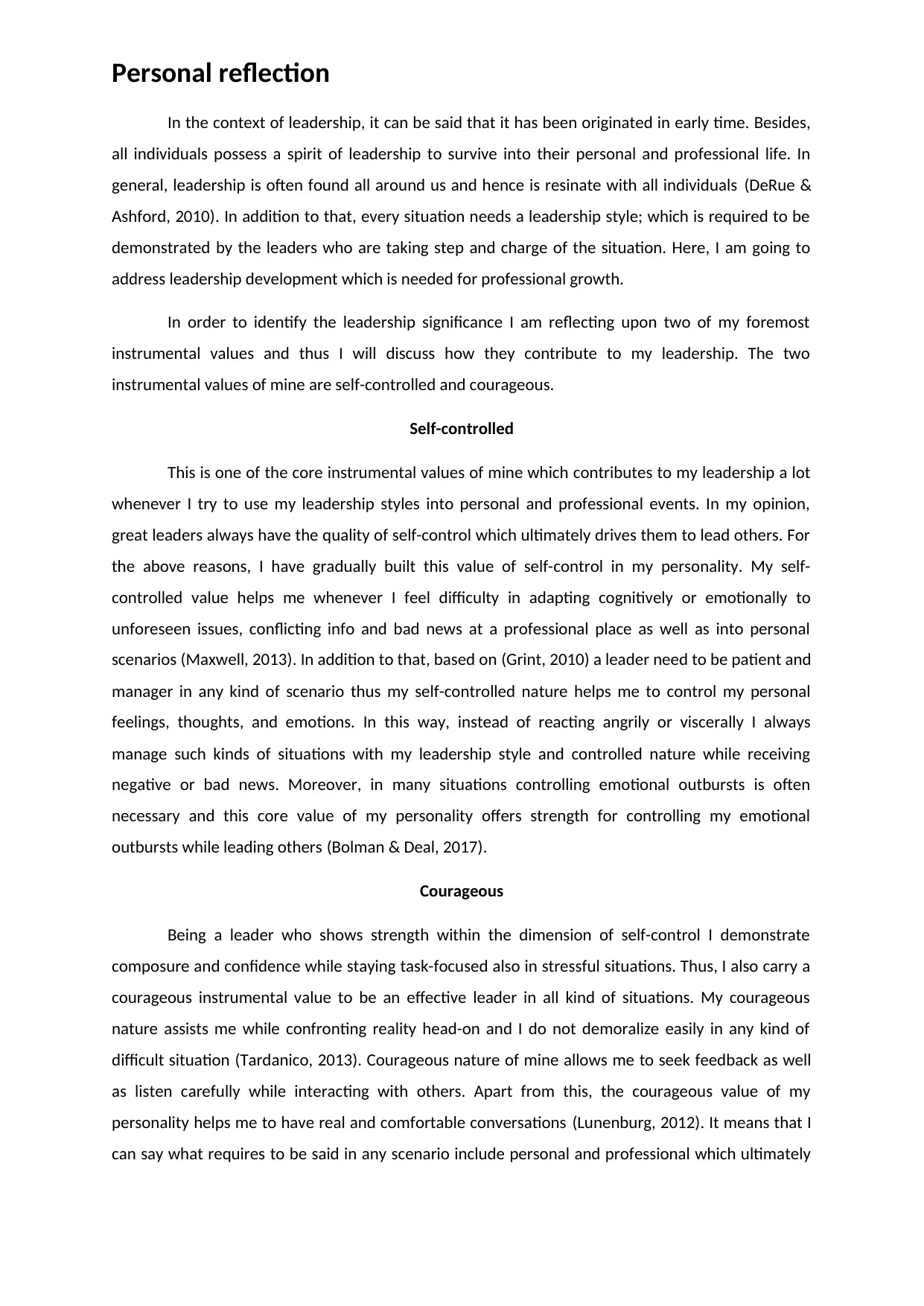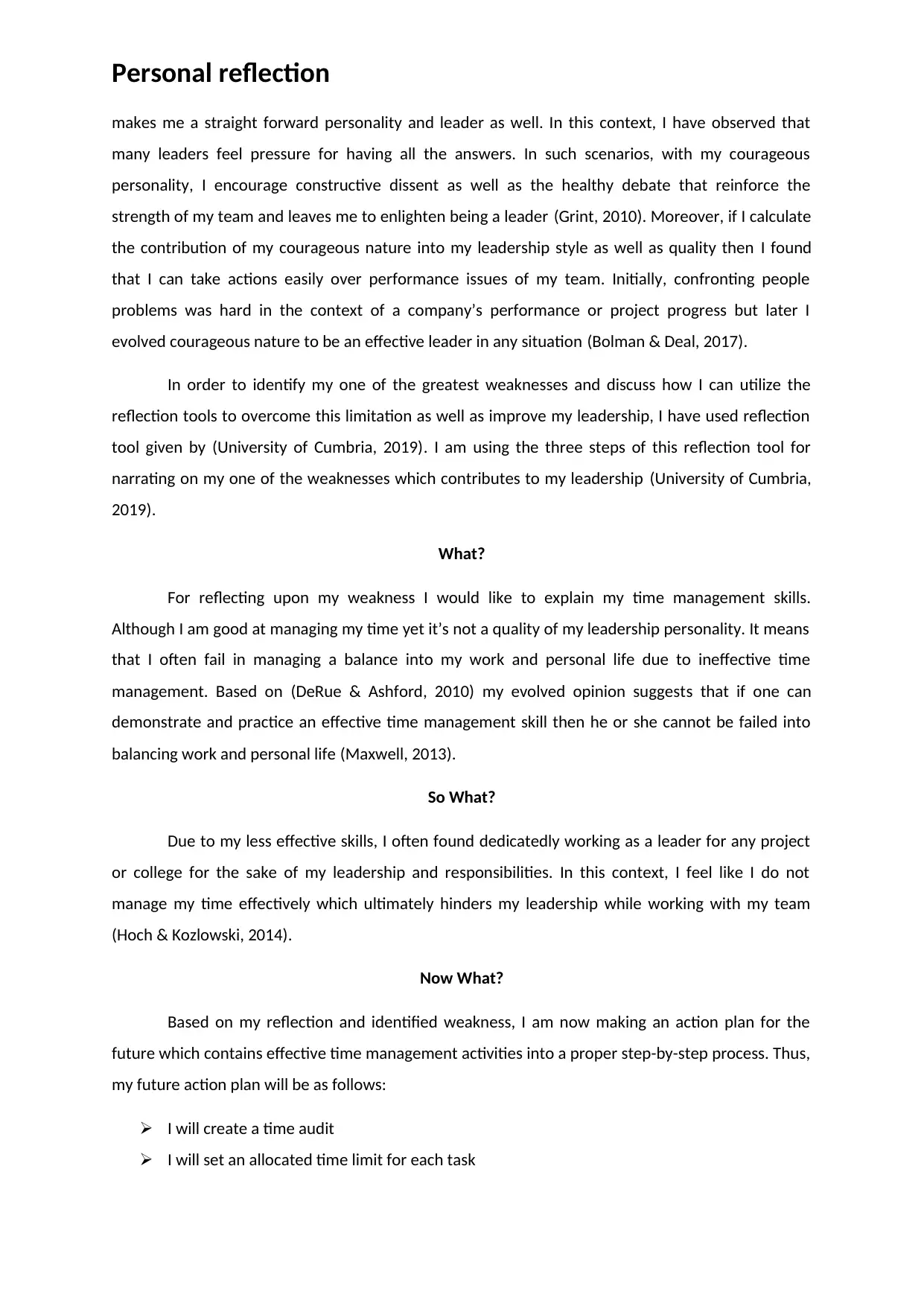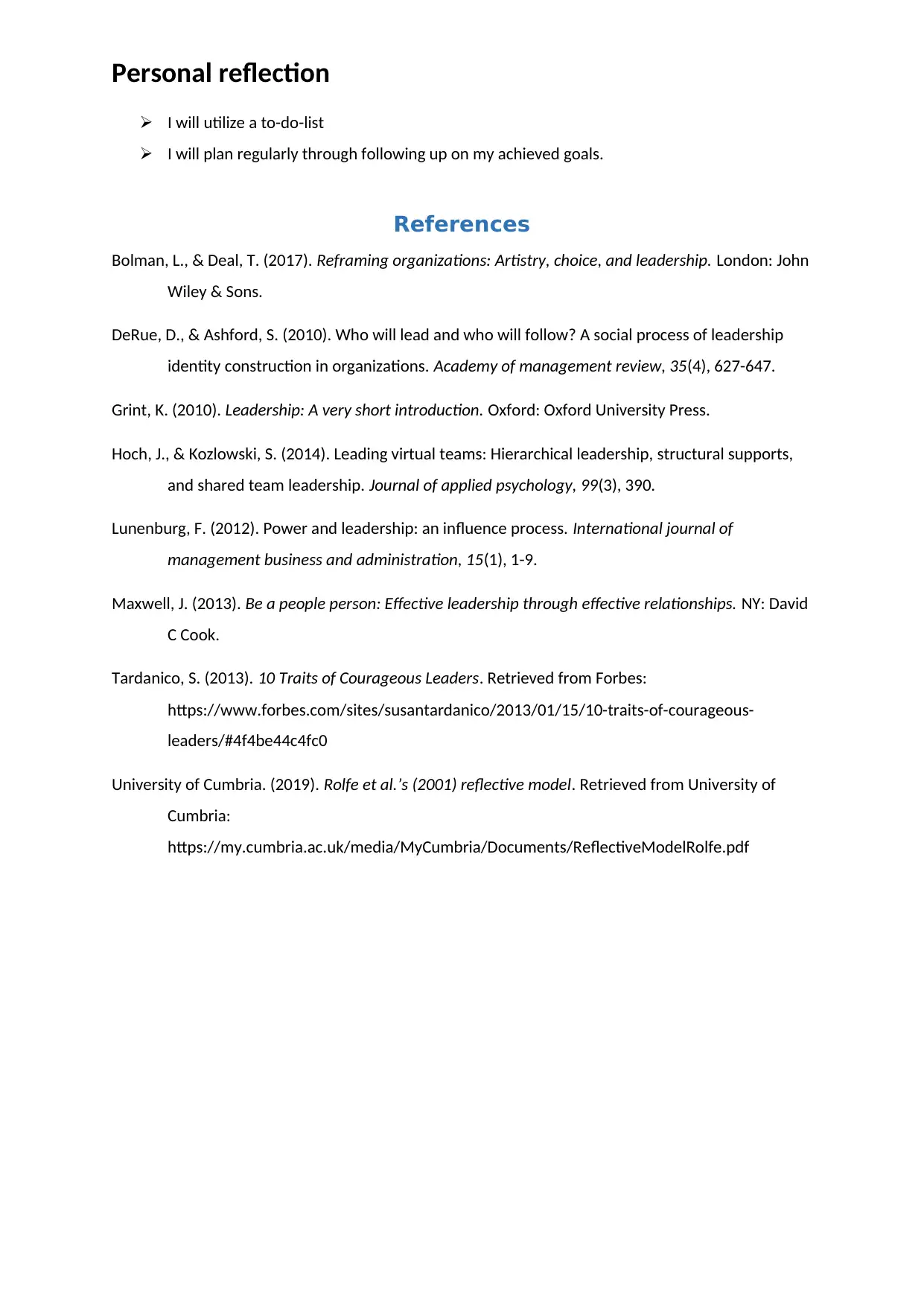MAN3121 Leadership Reflection: Values, Weakness, and Action Plan
VerifiedAdded on 2023/04/04
|3
|1012
|388
Homework Assignment
AI Summary
This assignment is a personal reflection on leadership, discussing the student's instrumental values and how they contribute to their leadership style. The student identifies self-control and courage as key values, explaining how these qualities influence their approach in both personal and professional contexts. The reflection also addresses a personal weakness – time management – and uses a reflection tool to analyze the issue, proposing an action plan to improve this skill. The student outlines steps such as creating a time audit, setting time limits, using a to-do list, and planning regularly to achieve their goals. The paper references several leadership and management theories and models to support the arguments presented, showing a comprehensive understanding of leadership development and self-improvement.

Personal reflection
In the context of leadership, it can be said that it has been originated in early time. Besides,
all individuals possess a spirit of leadership to survive into their personal and professional life. In
general, leadership is often found all around us and hence is resinate with all individuals (DeRue &
Ashford, 2010). In addition to that, every situation needs a leadership style; which is required to be
demonstrated by the leaders who are taking step and charge of the situation. Here, I am going to
address leadership development which is needed for professional growth.
In order to identify the leadership significance I am reflecting upon two of my foremost
instrumental values and thus I will discuss how they contribute to my leadership. The two
instrumental values of mine are self-controlled and courageous.
Self-controlled
This is one of the core instrumental values of mine which contributes to my leadership a lot
whenever I try to use my leadership styles into personal and professional events. In my opinion,
great leaders always have the quality of self-control which ultimately drives them to lead others. For
the above reasons, I have gradually built this value of self-control in my personality. My self-
controlled value helps me whenever I feel difficulty in adapting cognitively or emotionally to
unforeseen issues, conflicting info and bad news at a professional place as well as into personal
scenarios (Maxwell, 2013). In addition to that, based on (Grint, 2010) a leader need to be patient and
manager in any kind of scenario thus my self-controlled nature helps me to control my personal
feelings, thoughts, and emotions. In this way, instead of reacting angrily or viscerally I always
manage such kinds of situations with my leadership style and controlled nature while receiving
negative or bad news. Moreover, in many situations controlling emotional outbursts is often
necessary and this core value of my personality offers strength for controlling my emotional
outbursts while leading others (Bolman & Deal, 2017).
Courageous
Being a leader who shows strength within the dimension of self-control I demonstrate
composure and confidence while staying task-focused also in stressful situations. Thus, I also carry a
courageous instrumental value to be an effective leader in all kind of situations. My courageous
nature assists me while confronting reality head-on and I do not demoralize easily in any kind of
difficult situation (Tardanico, 2013). Courageous nature of mine allows me to seek feedback as well
as listen carefully while interacting with others. Apart from this, the courageous value of my
personality helps me to have real and comfortable conversations (Lunenburg, 2012). It means that I
can say what requires to be said in any scenario include personal and professional which ultimately
In the context of leadership, it can be said that it has been originated in early time. Besides,
all individuals possess a spirit of leadership to survive into their personal and professional life. In
general, leadership is often found all around us and hence is resinate with all individuals (DeRue &
Ashford, 2010). In addition to that, every situation needs a leadership style; which is required to be
demonstrated by the leaders who are taking step and charge of the situation. Here, I am going to
address leadership development which is needed for professional growth.
In order to identify the leadership significance I am reflecting upon two of my foremost
instrumental values and thus I will discuss how they contribute to my leadership. The two
instrumental values of mine are self-controlled and courageous.
Self-controlled
This is one of the core instrumental values of mine which contributes to my leadership a lot
whenever I try to use my leadership styles into personal and professional events. In my opinion,
great leaders always have the quality of self-control which ultimately drives them to lead others. For
the above reasons, I have gradually built this value of self-control in my personality. My self-
controlled value helps me whenever I feel difficulty in adapting cognitively or emotionally to
unforeseen issues, conflicting info and bad news at a professional place as well as into personal
scenarios (Maxwell, 2013). In addition to that, based on (Grint, 2010) a leader need to be patient and
manager in any kind of scenario thus my self-controlled nature helps me to control my personal
feelings, thoughts, and emotions. In this way, instead of reacting angrily or viscerally I always
manage such kinds of situations with my leadership style and controlled nature while receiving
negative or bad news. Moreover, in many situations controlling emotional outbursts is often
necessary and this core value of my personality offers strength for controlling my emotional
outbursts while leading others (Bolman & Deal, 2017).
Courageous
Being a leader who shows strength within the dimension of self-control I demonstrate
composure and confidence while staying task-focused also in stressful situations. Thus, I also carry a
courageous instrumental value to be an effective leader in all kind of situations. My courageous
nature assists me while confronting reality head-on and I do not demoralize easily in any kind of
difficult situation (Tardanico, 2013). Courageous nature of mine allows me to seek feedback as well
as listen carefully while interacting with others. Apart from this, the courageous value of my
personality helps me to have real and comfortable conversations (Lunenburg, 2012). It means that I
can say what requires to be said in any scenario include personal and professional which ultimately
Paraphrase This Document
Need a fresh take? Get an instant paraphrase of this document with our AI Paraphraser

Personal reflection
makes me a straight forward personality and leader as well. In this context, I have observed that
many leaders feel pressure for having all the answers. In such scenarios, with my courageous
personality, I encourage constructive dissent as well as the healthy debate that reinforce the
strength of my team and leaves me to enlighten being a leader (Grint, 2010). Moreover, if I calculate
the contribution of my courageous nature into my leadership style as well as quality then I found
that I can take actions easily over performance issues of my team. Initially, confronting people
problems was hard in the context of a company’s performance or project progress but later I
evolved courageous nature to be an effective leader in any situation (Bolman & Deal, 2017).
In order to identify my one of the greatest weaknesses and discuss how I can utilize the
reflection tools to overcome this limitation as well as improve my leadership, I have used reflection
tool given by (University of Cumbria, 2019). I am using the three steps of this reflection tool for
narrating on my one of the weaknesses which contributes to my leadership (University of Cumbria,
2019).
What?
For reflecting upon my weakness I would like to explain my time management skills.
Although I am good at managing my time yet it’s not a quality of my leadership personality. It means
that I often fail in managing a balance into my work and personal life due to ineffective time
management. Based on (DeRue & Ashford, 2010) my evolved opinion suggests that if one can
demonstrate and practice an effective time management skill then he or she cannot be failed into
balancing work and personal life (Maxwell, 2013).
So What?
Due to my less effective skills, I often found dedicatedly working as a leader for any project
or college for the sake of my leadership and responsibilities. In this context, I feel like I do not
manage my time effectively which ultimately hinders my leadership while working with my team
(Hoch & Kozlowski, 2014).
Now What?
Based on my reflection and identified weakness, I am now making an action plan for the
future which contains effective time management activities into a proper step-by-step process. Thus,
my future action plan will be as follows:
I will create a time audit
I will set an allocated time limit for each task
makes me a straight forward personality and leader as well. In this context, I have observed that
many leaders feel pressure for having all the answers. In such scenarios, with my courageous
personality, I encourage constructive dissent as well as the healthy debate that reinforce the
strength of my team and leaves me to enlighten being a leader (Grint, 2010). Moreover, if I calculate
the contribution of my courageous nature into my leadership style as well as quality then I found
that I can take actions easily over performance issues of my team. Initially, confronting people
problems was hard in the context of a company’s performance or project progress but later I
evolved courageous nature to be an effective leader in any situation (Bolman & Deal, 2017).
In order to identify my one of the greatest weaknesses and discuss how I can utilize the
reflection tools to overcome this limitation as well as improve my leadership, I have used reflection
tool given by (University of Cumbria, 2019). I am using the three steps of this reflection tool for
narrating on my one of the weaknesses which contributes to my leadership (University of Cumbria,
2019).
What?
For reflecting upon my weakness I would like to explain my time management skills.
Although I am good at managing my time yet it’s not a quality of my leadership personality. It means
that I often fail in managing a balance into my work and personal life due to ineffective time
management. Based on (DeRue & Ashford, 2010) my evolved opinion suggests that if one can
demonstrate and practice an effective time management skill then he or she cannot be failed into
balancing work and personal life (Maxwell, 2013).
So What?
Due to my less effective skills, I often found dedicatedly working as a leader for any project
or college for the sake of my leadership and responsibilities. In this context, I feel like I do not
manage my time effectively which ultimately hinders my leadership while working with my team
(Hoch & Kozlowski, 2014).
Now What?
Based on my reflection and identified weakness, I am now making an action plan for the
future which contains effective time management activities into a proper step-by-step process. Thus,
my future action plan will be as follows:
I will create a time audit
I will set an allocated time limit for each task

Personal reflection
I will utilize a to-do-list
I will plan regularly through following up on my achieved goals.
References
Bolman, L., & Deal, T. (2017). Reframing organizations: Artistry, choice, and leadership. London: John
Wiley & Sons.
DeRue, D., & Ashford, S. (2010). Who will lead and who will follow? A social process of leadership
identity construction in organizations. Academy of management review, 35(4), 627-647.
Grint, K. (2010). Leadership: A very short introduction. Oxford: Oxford University Press.
Hoch, J., & Kozlowski, S. (2014). Leading virtual teams: Hierarchical leadership, structural supports,
and shared team leadership. Journal of applied psychology, 99(3), 390.
Lunenburg, F. (2012). Power and leadership: an influence process. International journal of
management business and administration, 15(1), 1-9.
Maxwell, J. (2013). Be a people person: Effective leadership through effective relationships. NY: David
C Cook.
Tardanico, S. (2013). 10 Traits of Courageous Leaders. Retrieved from Forbes:
https://www.forbes.com/sites/susantardanico/2013/01/15/10-traits-of-courageous-
leaders/#4f4be44c4fc0
University of Cumbria. (2019). Rolfe et al.’s (2001) reflective model. Retrieved from University of
Cumbria:
https://my.cumbria.ac.uk/media/MyCumbria/Documents/ReflectiveModelRolfe.pdf
I will utilize a to-do-list
I will plan regularly through following up on my achieved goals.
References
Bolman, L., & Deal, T. (2017). Reframing organizations: Artistry, choice, and leadership. London: John
Wiley & Sons.
DeRue, D., & Ashford, S. (2010). Who will lead and who will follow? A social process of leadership
identity construction in organizations. Academy of management review, 35(4), 627-647.
Grint, K. (2010). Leadership: A very short introduction. Oxford: Oxford University Press.
Hoch, J., & Kozlowski, S. (2014). Leading virtual teams: Hierarchical leadership, structural supports,
and shared team leadership. Journal of applied psychology, 99(3), 390.
Lunenburg, F. (2012). Power and leadership: an influence process. International journal of
management business and administration, 15(1), 1-9.
Maxwell, J. (2013). Be a people person: Effective leadership through effective relationships. NY: David
C Cook.
Tardanico, S. (2013). 10 Traits of Courageous Leaders. Retrieved from Forbes:
https://www.forbes.com/sites/susantardanico/2013/01/15/10-traits-of-courageous-
leaders/#4f4be44c4fc0
University of Cumbria. (2019). Rolfe et al.’s (2001) reflective model. Retrieved from University of
Cumbria:
https://my.cumbria.ac.uk/media/MyCumbria/Documents/ReflectiveModelRolfe.pdf
⊘ This is a preview!⊘
Do you want full access?
Subscribe today to unlock all pages.

Trusted by 1+ million students worldwide
1 out of 3
Related Documents
Your All-in-One AI-Powered Toolkit for Academic Success.
+13062052269
info@desklib.com
Available 24*7 on WhatsApp / Email
![[object Object]](/_next/static/media/star-bottom.7253800d.svg)
Unlock your academic potential
Copyright © 2020–2026 A2Z Services. All Rights Reserved. Developed and managed by ZUCOL.





